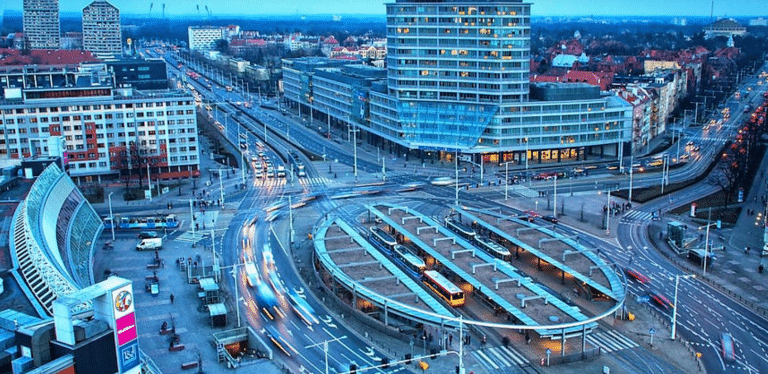No one-size-fits-all model
Sylwia Ziemacka talked to Ewa Jarczewska-Gerc, PhD in psychology.
Ewa is an assistant professor at SWPS University in Warsaw. 18 years of professional experience. She leads lectures, trainings, consulting & research. She specializes in motivational & health fields, also in organizational resilience & mental health prevention. Scholarship holder at Indiana University of Pennsylvania in the United States.
Post-pandemic returns to the office are beginning. Some people do not need to be talked into it, others cannot be persuaded. Why do some people not want to go back to work in the office?
The case is complex. The pandemic helped make many people aware that man does not live by work alone, that you do not have to chase new goals all the time, that you can live a good life, spend fun time with your loved ones or develop your passions. This is one thing. The second thing is a generational change. Probably our children’s generation will be the first to earn less than we do. Currently, earnings are constantly growing. Our children grow up in a world where money is not a means of meeting a need. It simply is and there is enough of it, meaning earning a lot of money is no longer a life goal. However, as for other generations, we must refer to how the pandemic influenced their way of thinking, and it is worth realizing that in Poland during the pandemic only between 12 and 17 % of society worked remotely. So we are talking mainly about people working in offices, in corporations. Before the pandemic, these people worked a lot at the expense of their private lives, which they often had only in theory. When the pandemic locked us in our homes, it was initially a shock. People could not find themselves in it. They felt bad. Some ate too much, others drank or smoked. But as happens with a crisis, it often leads to good changes, because the crisis means not only threat but also the chance. The pandemic has become an opportunity for people to even see that they can live differently, that, for example, you don’t have to spend two or even three hours a day commuting to work. I did a lot of research during the pandemic, and for some it really changed their lives. Many people have moved out of, for example, large cities. They bought a house on the outskirts or in the countryside with good internet and simply worked remotely. People at the moment do not want to return to this pre-pandemic regime because they felt freedom and experienced a greater impact on their own lives. It turned out that thanks to remote work, many people felt that they had a greater influence on their work. This is an extremely important element of job satisfaction and works a lot against burnout. The fact that I have a sense of influence, that I can influence the time of my work, its course – when I start, when I finish it, what happens in the process. People don’t want to lose this sense of control, so many people don’t want to go back to the office completely for 5 days or even in a hybrid model for two or three days.
What can employers do?
First, it is important to understand that a complete return to the office will not work for objective reasons. I work a lot with business, doing various projects and training with companies. For the most part, even employers say that they will not force people to return to the office, because it would be a total violation of their needs. I know that in the United States, for example, there are places where you are forced to go back to the office. I do not know what the effects of this are yet, because this is just the beginning. On the other hand, in Poland, I have not met such a company, which does not mean that there is no such company that would require a full return to the office. Most often, they have a flexible approach to the topic and the employee entirely decides how he or she will work. I am not a fan of this approach, because there can be abuses. When we have too much freedom, too much such space, we can get lost in it. That’s why there should be some rules of remote-first or office-first modes.
On the other hand, I generally recommend an honest conversation with employees or doing a survey among employees as to what model they would like to work in, to see, for example, the proportions of how many people do not want to come back, how many people want to partially, what are also personality traits or some other variables that are connected with the fact that people choose to work remotely or choose to work in an office. Expanding this topic would be very useful. I carried out such research together with Mirosław Filipiak, Bartłomiej Brach and Agnieszka Szamałek-Michalska from CD Projekt. On the basis of this research, two such models were developed – one more remote and the other more office-based. However, CD Projekt employees have to define themselves as to how they imagine their work for the next six months. Due to the fact that their associates also need to know where they can find them, how to contact them. In the office, this also applies to the arrangement of desks and the arrangement of space in general. Well, it turns out that people are divided fifty-fifty, into those who want to work remotely and those who want to work more often from the office.
Here, a very important variable is personality and how we process stimuli. There are people who need these stimuli a lot and they become ineffective at home because they have too little such stimuli. When you go to the office you meet people and more stimulus comes to you. It bothers some, but helps many, because they feel good in all the hustle and bustle. They feel in such an optimal motivational state and they carry out their work effectively. There are also people who feel terrible when coming to the office and interacting in real time. They are then overloaded, they are not able to do the so-called deep work, i.e. when they have to come up with something, be creative and do something deeper, it becomes very problematic. I think the pandemic has shown us that there can be many of these models. That is why it is worth asking employees about their preferences, because there is no single pattern that can be applied to all employees in all companies and at all positions.
How do employers find themselves in all of this?
What we are seeing now is an attempt to structure remote work by introducing specific rules, but also looking for a compromise between the expectations of employees and employers.
One more thing to realize is that research shows that most people feel bad when they feel they are getting something inadequate, something they did not worked out. It opens the way to trust a significant part of employees. People have a certain sense of responsibility and the need to fulfill their responsibilities. Mid-level managers have become extremely important and companies are now investing heavily in their skills. If such a person is not very assertive, cannot manage, cannot tell people what to do, then he or she simply will not be able to cope with the current model of work. Such persons de facto shape the relationship between the employee and the employer. This flexible management is not about pointing the finger, scaring, etc. But you have to be able to set boundaries.
How does remote work affect efficiency?
Research shows that it was difficult to measure efficiency in a pandemic. In our research, we measured subjective efficiency and related it to the work model in which a person works. The research showed that in fact, this subjective efficiency was even slightly higher in the remote model, although of course it could be because people wanted to prove that they were effective. But it seems that the effectiveness in remote work was not worse than in the situation in stationary work.
And what does realization of the need for social contact look like? Isn’t being with people in the office part of caring for our psychosocial well-being?
When it comes to the impact of interactions with other people on a person, we are really very different in this respect. There are people who, regardless of their personality, should not isolate themselves from others. Even if they have small social needs, staying at home can make anxiety or depressive disorders worse. So sitting at home, even if we don’t like high stimulation, is not good for a human being. Of course, the amount of this stimulation is important. A person with a higher level of reactivity, i.e. with a lower need for stimulation, needs these interactions less, because then they are more effective. On the other hand, there are people who totally need this stimulation, need this external stimulus and for them remote work is associated with a much greater cost and lower effectiveness.
In general, however, we are more and more lonely, and this is certainly one of the factors of deepening mental problems. Reports, including those from before the pandemic, showed that all disease entities, including anxiety disorders and depression, are rising.
In the context of the pandemic, I wonder if it is that the pandemic actually caused us to worsen our mental state, or it was not that this crisis finally became the moment when many people left the closet?
We conclude on the basis of various epidemiological studies, i.e. how many people report to doctors and psychotherapists, and on declarative tests, i.e. how we declare our own well-being or mental health. We observe that more people suffer from various mental health problems compared to the pre-pandemic. And now my question is whether it was the pandemic that caused it, or did it dare us to seek help. Probably both.
The problem is loneliness plus an excess of such simple pleasures combined with a lack of commitment. Because when you see another person, when you smell them, you feel their energy, you see their reactions, it is easier to get involved, either personally, in a personal or professional sense. On the other hand, the computer gives us the possibility of very little involvement. We have social needs, but we serve ourselves other pleasures, e.g. we fall into a series, of computer games, alcohol and so on and so on. Someone might ask what is wrong with this type of pleasure? Everything would be OK if thanks to it our level of mental pathology decreased, but unfortunately this level of mental pathology is rising dramatically. People are less and less happy. They watch TV series more and more, consume more, drink more, smoke more and more, and in fact are not more and more happy. There is no logic here. We have an overabundance of this simple pleasure that is not about commitment and meaning. And happiness that is not based on commitment and a sense of meaning is needed by every human being.
Do you agree that the hybrid model is a compromise between the needs of various groups of employees and employers?
I believe that the hybrid is a compromise. The question is what exactly should it look like. It should depend on many factors, so there is no universal model like 2+3 or 3+2. It should be related to the company’s needs, the specificity of the industry, relations between employees, organizational culture and employee preferences. I am not a fan of completely remote work, because I believe that then the employee may detach him or herself from the base and cease to remember the values a given company embodies. It is the same in private life, when we stop communicating with each other, stop remembering our values, such a relationship easily breaks up. These values are starting to diverge. Concentrating only on finances is short-lived. We need meaning and some kind of commitment.







